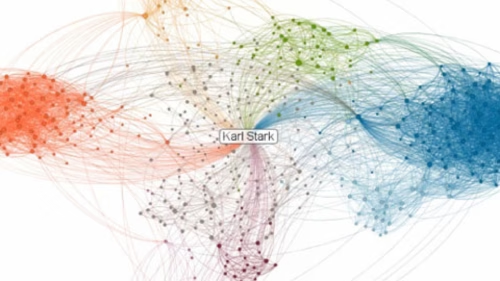With the ever-expanding use of data thanks to new digital technologies, businesses are increasingly looking to utilize large volumes of data obtained from multiple sources.
It is expected that 436 exabytes of data will be generated each day in 2025. Big data has the potential to give a competitive advantage to businesses that utilize it efficiently for predictive forecasting, task automation, etc. Just consider the success of Netflix’s recommendation system and you will have an idea of just what an advantage we are talking about.
Traditional software technologies like storage and data processing applications are incapable of extrapolating predictions or insights from the large amounts of data being generated daily. Businesses are actively investing in the latest technologies to try to utilize this data to monetize it and boost profits. Indeed, so important is data and its insights that it has been called the new oil.
This gold rush has created the requirement for skilled big data professionals. Talented big data developers and big data engineers are in demand for this reason.
If you are interested in developing a big data application, you will require big data developers.
You might have thought about hiring freelance big data developers due to the increasing popularity of freelance marketplaces. However, freelance developers are only really suitable for simple software development projects.
Big data is a complex field. To build a great big data application, you will require highly-skilled software developers to undertake the big data project successfully. We will discuss this in detail shortly.

Get a complimentary discovery call and a free ballpark estimate for your project
Trusted by 100x of startups and companies like
First, you need to know the skills requirements for big data developers to make the right hiring decisions.
Primary Skills for Big Data Developers
Big data developers need to have the following primary skills:
- Proficiency in Python or R, programming languages commonly used for data science;
- Experience in software tools for statistical analysis like Matlab, SPSS, etc.;
- Proficiency in general-purpose programming languages such as Python, PHP, C#, etc.;
- Experience in Hadoop development techniques, like HDFS, MapReduce, etc.;
- Expertise in NoSQL databases like Pig, Hive, etc.;
- Knowledge of SQL storage;
- Familiarity with Lambda architecture for real-time processing of enormous datasets;
- Experience in using data exploration tools such as Tableau, spreadsheets, etc.;
- Expertise in data acquisition tools like Sqoop, Flume, etc.;
- Knowledge of data analysis software like Spark;
- Expertise in big data algorithm development;
- Familiarity with text analysis using NLP techniques;
- Expertise in ETL (extract-transfer-load) for data pipelines;
- Experience in API design and development;
- Knowledge of DevOps practices like task automation, CI/CD, orchestration, etc.;
- Thorough understanding of operating systems and concepts like multi-threading, concurrency, etc.
- Knowledge of agile development methodologies and frameworks like Scrum, test-driven development, feature-driven development, etc.
Other Skills for Big Data Developers
1. Expertise in Mathematics and Statistics
You require developers with a strong background in mathematics and statistics. Developers should know linear algebra and calculus to understand the underlying working of data science algorithms.
They should be thoroughly familiar with probability concepts, compressed sensing, dimensional analysis, etc. These mathematical skills will help your developers successfully implement big data algorithms for predictive modeling, etc.
2. Knowledge of Machine Learning algorithms
You need developers with extensive knowledge of machine learning algorithms like regression, clustering, classification, etc. Developers should be familiar with neural networks and deep learning to process structured and unstructured data.
ML algorithms help train huge business data and find patterns in them to derive valuable insights such as individual customer preferences, customer churn, etc.
Your developers also need to know related big data platforms and techniques to implement machine learning algorithms efficiently, for example, TensorFlow, Keras, Scikit-learn, Caffe, etc. These machine-learning libraries include standard implementations of machine-learning algorithms that accelerate model development for developers.
3. Experience in using Cloud Computing Technologies
You need software developers experienced in cloud computing. Big data processing requires high levels of reliable storage and computing power.
Moreover, these managed cloud resources are easily scalable and utilize the latest technologies, which is important, especially for security, etc. Look for big data developers familiar with AWS data lakes and analytics, Google Cloud Data Studio, Dataflow, etc.
4. Software Testing and Code Review Skills
Software application testing is essential to ensure the software meets all functional and non-functional requirements. You need big data developers experts in unit testing, integration testing, penetration testing, security testing, etc. Experienced developers can perform efficient code reviews where they spot bugs and issues before application deployment.
5. Soft Skills
Successful big data developers need to have certain soft or interpersonal skills, some of which are as follows:
- Communication: Big data developers work with complex algorithms and abstract technical solutions. Good verbal and written communication skills help them convey their ideas effectively, something which boosts productivity and cuts down on mistakes.
- Passion for Excellence: You need developers passionate about advanced technologies. Big data modeling is a complex task. Passionate developers are motivated to learn new big data technologies and deliver big data systems with advanced capabilities.
- Team Player: You require a big data engineer who can collaborate with other team members, including designers, testers, and other developers. A complex data science project involves multiple team members, your developers should be able to work as a team.
- Commitment: Your developers need the commitment to deliver the required software functionalities. Big data projects often face issues like strict security and data privacy regulations, technological advancements, etc.; your developers should be committed to overcoming all challenges and developing the desired software solution.
How to Hire the Best Big Data Developers?
You now know the skills required for a big data engineer and you can start the hiring process, which consists of the following steps:
1. Decide on the hiring platform:
Hire expert big data developers for your next project
1,200 top developers
us since 2016
You require the right team to realize the true potential of your big data application. Therefore, you need to choose the right platform to hire suitable developers for your project.
Freelance marketplaces are popular today as they quickly offer multiple profiles of freelance developers with varied skills and experience levels. However, freelance platforms are very saturated, and it is difficult to screen so many freelancers to establish their real expertise.
Freelance platforms offer no assistance in this regard, as there is no thorough screening process. You have to interview developers yourself, and in case of a misjudgment, the result is a poor end product, bugs, and cost overruns.
Project management also gets difficult with freelancers, especially if they are located in different countries. Most freelancers work part-time, and there is a big chance they do not have enough bandwidth to undertake your big data project.
Given these drawbacks of working with freelancers, we suggest you partner with a credible software development company such as DevTeamSpace and hire experienced big data developers.
All our software developers at DevTeamSpace are vetted for their software development skills and are retrained to use the latest technologies. We have lots of big data developers experienced in data modeling and application development with experience in just about every industry possible.
Moreover, our account managers, who are experienced senior software developers, manage these developers. All our developers follow an AI-powered agile development process that helps with efficient project management. It streamlines communication, tracks developers’ performance, provides daily/weekly performance reports to clients, etc.
We sign an NDA with our onboarding clients and uphold privacy requirements. The agreement also ensures that developers get paid only once they are satisfied with the quality of their work. Hire managed, experienced, and dedicated developers from DevTeam.Space for your big data project.
2. Interview the shortlisted candidates:
You have decided on the hiring platform, posted your skills requirements, and received several profiles from interested candidates. Now, you need to shortlist candidates and call them for an interview.
We suggest you take help from colleagues and friends with relevant experience in data science to conduct interviews if you do not have big data expertise.
You need to assess the in-depth data science knowledge of developers during interviews. Ask them in-depth questions about machine learning algorithms such as their application in data analytics and big data tools, why they prefer using certain data science libraries, etc.
You can also discuss your big data project and ask how a candidate would handle certain project aspects such as data gathering, application security, etc.
3. Explain your big data project in detail to the new developers:
You have hired big data developers best suited to your project, and now you should onboard them. Set up communication channels and introduce your new developers to your existing team members. Give new hires access to the relevant project documentation and code repositories.
Explain your big data project in detail to the new developers, including your objectives and goals. You need to set up a project plan, assign tasks, discuss milestones, and establish accountability. A smooth onboarding process will help new developers adjust to the team and contribute efficiently to the project.
Tips to Hire Big Data Developers
1. Hire a competent remote team lead:
You will likely decide to work with remote developers as you can hire them from a global talent pool and not have to bear office setup and maintenance expenses, etc. This is a smart decision.
Hire expert big data developers for your next project
We suggest you hire an experienced software engineer to lead your project team. The team lead will have one-on-one interactions with each team member and mentor them while making team management a lot easier for you. This team lead should have experience in working with remote teams.
2. Look for a flexible service provider:
You need a flexible hiring model when you partner with a software development company for big data developers. A fixed-price model might not work for a complex big-data project based on cutting-edge technologies.
You could come up against time-delay issues such s changing big data governance policies, end-user requirements, etc., so a flexible time-and-materials model is more appropriate. It will help you scale your team quickly per project requirements without any unnecessary waste of resources.
3. Hire senior developers with a range of skills and experience:
While junior or mid-level developers are easily available at a lower cost, you cannot entrust your complete big data project solely to them. Junior developers especially need one-on-one guidance when implementing complex technologies.
You must create a solid foundation of senior developers in your team who have experience in various software architectures, development technologies, and tools. These experienced developers can help and even manage your junior and mid-level developers to ensure they adopt the right approach.
Senior developers come at a higher price, but they add enormous value to the team and help them to build high-performance and robust software that brings long-term profits.
Example of Questions to Ask Big Data Developers During an Interview
1. What are the main steps involved in the deployment of a big data model?
The main steps to deploying a big data model include data ingestion, storage, and processing. Data ingestion involves the collection of data from various sources like log files, social media, etc. Data storage relates to the storage of big data after data extraction. Here Hadoop Distributed File System plays a big role. Data processing involves the analysis and visualization of big data using suitable algorithms and data visualization tools.
2. What is fsck in Hadoop?
Fsck stands for file system check and is used to check discrepancies in the file, such as missing blocks, etc.
3. When should we use MapReduce with big data?
MapReduce allows the application of distributed computing on big and complex data sets in parallel. The programming model is suitable for iterative computation on big data. The map function filters and sorts data, whereas the reduce outputs a summary.
Submit a Project with Zero Risk
Businesses, big and small, are channeling their resources into understanding big data and gaining valuable insights. However, big data analytics can get complicated as it is based on cutting-edge technologies.
Why risk the success of your big data application by partnering with anything but the best software developers?
DevTeam.Space is a community of field-expert software developers experienced in developing next-level big data software solutions. All our developers are trained in the AI-powered agile process for efficient project management.
If you plan to partner with our big data developers for your big data project, you can send us your initial project specifications via this quick form. One of our account managers will get in touch to discuss further details on how we can help you build a successful big data solution.










